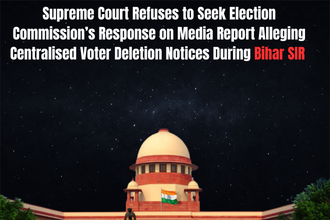In a significant ruling dated April 15, 2025, the Supreme Court of India reaffirmed the constitutional validity of Section 498A of the Indian Penal Code (IPC), emphasizing that it is not violative of Article 14 of the Constitution. The Bench comprising Justice Surya Kant and Justice N Kotiswar Singh dismissed a plea that challenged the provision on the ground of gender discrimination, reiterating that the protection of women against cruelty is a legitimate legislative goal in line with constitutional mandates.
This decision comes amid ongoing debates surrounding the alleged misuse of Section 498A by women in matrimonial disputes. The apex court’s verdict is a crucial reaffirmation of the judiciary’s commitment to safeguard women’s rights while also ensuring that allegations of misuse are addressed appropriately.
Understanding Section 498A IPC
Section 498A of the Indian Penal Code was introduced in 1983 to protect married women from cruelty inflicted by their husbands or the relatives of the husband. The section defines “cruelty” broadly, including both physical and mental harassment, and covers situations where a woman is driven to commit suicide or suffer grave injury due to such cruelty.
The provision is cognizable, non-bailable, and non-compoundable, which means the police can arrest the accused without a warrant, and the case cannot be withdrawn by the complainant once filed. Over the years, this provision has been the subject of intense legal and public scrutiny, with critics alleging that it is often misused by women to harass their spouses and in-laws.
The Petitioner’s Argument
The petitioner before the Supreme Court argued that Section 498A is discriminatory as it only allows women to file complaints under the provision, whereas in many countries, domestic violence laws are gender-neutral. The petitioner contended that such a gender-specific provision violates Article 14 of the Constitution, which guarantees equality before the law and equal protection of the laws to all persons.
Supreme Court’s Response
Rejecting the petition, the Supreme Court stated unequivocally that the plea was “wholly misconceived and misdirected.” The Bench emphasized that Article 15 of the Constitution explicitly permits the State to enact special provisions for the protection and upliftment of women and children.
“The court finds no reason to interfere. Article 15 explicitly empowers the legislature to enact special laws for the protection of women. Section 498A is a legitimate and necessary provision aimed at addressing a specific societal problem,” the Bench observed.
The Court acknowledged the possibility of misuse but stressed that such allegations must be evaluated on a case-by-case basis.
“There are cases of misuse of every law. Do you want us to make sweeping statements? There may be instances where the women have been victimised. There might be cases where the provision would have been misused. So it is the duty of the court to decide each case based on its peculiar facts,” the Court noted.
Sovereignty and Legislative Independence
In response to the petitioner’s argument that India should adopt a gender-neutral domestic violence framework like in other countries, the Court strongly asserted India’s legislative sovereignty.
“We maintain our sovereignty. Why should we follow others? They should follow us,” remarked the Bench.
This statement underscores the judiciary’s view that Indian laws must reflect the social realities and constitutional principles unique to the country, rather than being shaped solely by global practices.
The Larger Debate on Misuse of Section 498A
Over the years, several judicial pronouncements have acknowledged the misuse of Section 498A. In Rajesh Sharma v. State of UP (2017), the Supreme Court had laid down guidelines to prevent misuse, including the formation of Family Welfare Committees. However, these guidelines were later reconsidered in Social Action Forum for Manav Adhikar v. Union of India (2018), where the Court emphasized that courts cannot create laws or procedures that override statutory provisions.
Despite concerns of misuse, the courts have repeatedly clarified that the existence of false or exaggerated complaints does not negate the need for a law like Section 498A. The real challenge lies in ensuring proper judicial scrutiny and procedural safeguards.
Balancing Women’s Rights and Fair Trial
The recent judgment highlights a balanced approach — while the Court supports the continuance of special protections for women under Section 498A, it also recognizes the need to guard against its misuse. The judiciary’s role, therefore, is to carefully adjudicate each case on its merits, ensuring justice for both complainants and the accused.
This approach also aligns with the broader principles of fair trial and due process, which are cornerstones of the Indian legal system. Rather than diluting the provision or making sweeping changes based on isolated misuse, the Court emphasized judicial prudence and factual analysis in individual cases.
Implications of the Ruling
This ruling reinforces the judiciary’s stance that legislative protections for women, particularly in the context of domestic violence and cruelty, are constitutionally valid and necessary. It also sends a strong message that concerns about misuse cannot form the basis for striking down such provisions.
At the same time, the Court’s call for case-by-case scrutiny encourages lower courts to ensure that justice is served fairly, without being swayed by generalized assumptions.
For lawyers, social activists, and policymakers, the ruling serves as a reminder of the importance of nuanced discourse in legal reforms. It also highlights the critical role of the judiciary in maintaining a balance between individual rights and societal interests.
Conclusion
The Supreme Court’s reaffirmation of Section 498A IPC as constitutionally valid under Article 14 marks an important moment in the ongoing debate around women-centric laws in India. While acknowledging the realities of misuse, the judgment upholds the legislative intent to protect women from domestic cruelty — a grave and persistent issue in Indian society.
As the law stands, courts will continue to play a crucial role in adjudicating allegations with fairness and sensitivity, ensuring that justice is neither denied to genuine victims nor misused as a tool of harassment.


